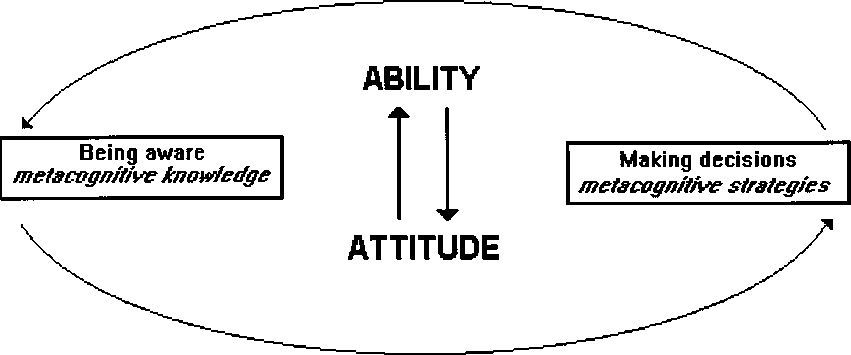process involved. Session 4 was about metacognitive strategies. Session 5 dealt with
metacognitive awareness and verbal reports. Session 6 introduced the concept of
metacognitive knowledge and session 7 specifically analysed person, a category of
metacognitive knowledge (see handouts of these sessions in appendix 4).
7.1.2.2.1 About a model of self-directed learning process
As it was the first session of this sort, I started with my own definition of self-
direction and the difference I saw between this concept and autonomy (see discussion of
this issue in 4.3.3, p. 104). I explained to the participants that this definition implied two
essential elements, ability and attitude, that were intimately related and fed into each
other. I also introduced the concepts of metacognitive knowledge and strategies as the
be-aware and make-decisions processes that make up the core of self-direction. The
following diagram explains this (it was included in the handout for this session):

Fig. 7.2 Definition of the process of self-directed learning
In this session I also introduced a model of self-directed learning process. The
following is an extract of the handout I gave to the participants (translated from
Spanish):
|
1 |
2 |
3 |
4 |
5 |
6 |
|
> |
> |
> |
> |
> |
÷ |
|
be |
notice |
structure |
renotice & restructure (test hypothesis) |
practise |
use |
194
More intriguing information
1. The name is absent2. IMMIGRATION POLICY AND THE AGRICULTURAL LABOR MARKET: THE EFFECT ON JOB DURATION
3. The name is absent
4. Foreign direct investment in the Indian telecommunications sector
5. The name is absent
6. THE ANDEAN PRICE BAND SYSTEM: EFFECTS ON PRICES, PROTECTION AND PRODUCER WELFARE
7. SLA RESEARCH ON SELF-DIRECTION: THEORETICAL AND PRACTICAL ISSUES
8. The Impact of Hosting a Major Sport Event on the South African Economy
9. THE UNCERTAIN FUTURE OF THE MEXICAN MARKET FOR U.S. COTTON: IMPACT OF THE ELIMINATION OF TEXTILE AND CLOTHING QUOTAS
10. Tariff Escalation and Invasive Species Risk